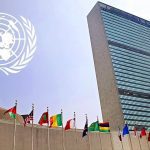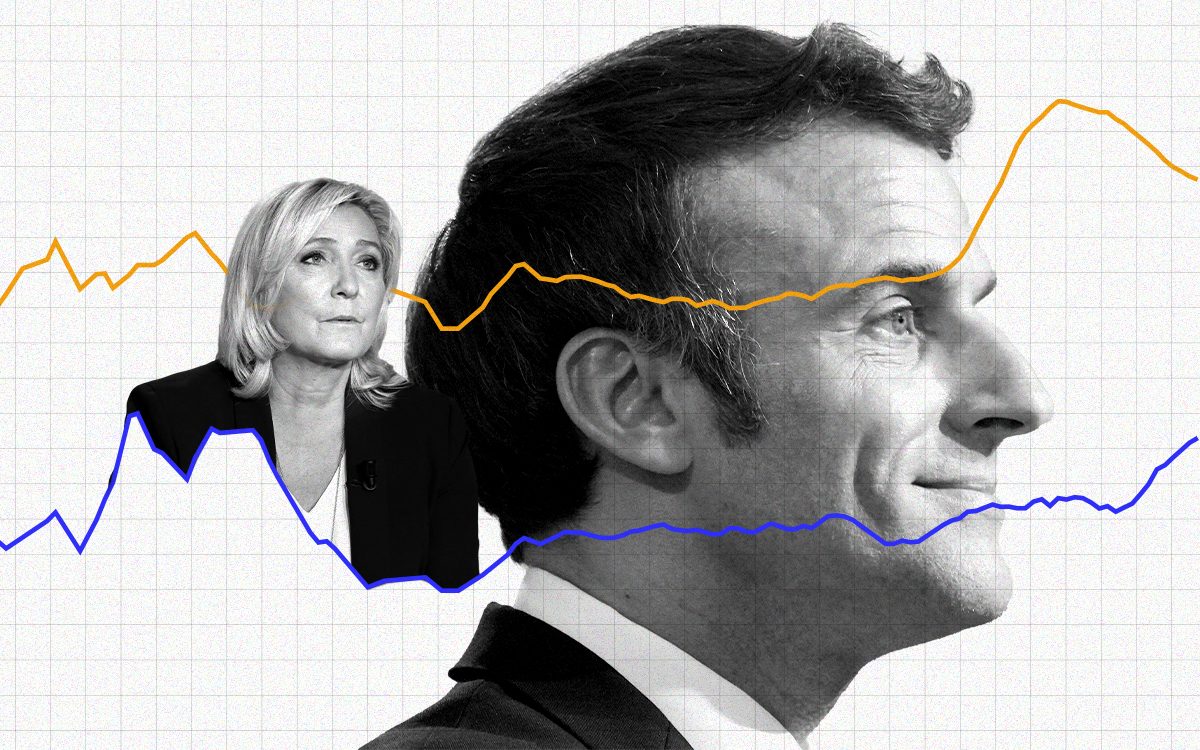After several vicissitudes, the first round of the French election will perhaps lead President Emmanuel Macron to face off against Marine Le Pen in a second round of presidential election, with all opinion polls suggesting the gap between the two candidates is narrowing. For the first time, ruling out Marine Le Pen’s victory is no longer possible as the far-right candidate is gaining new votes every day in a time when President Macron mishandled his presidential campaign. Further complicating matters for Macron, the French Senate blew up a surprise, publishing a report that lambasted Macron’s government for its links with US firm McKinsey, which took advantage of Macron’s term in office to be awarded several contracts.
Negative Assessment
Negative assessment of the election campaign struck a chord among observers. Over the past years, France has experienced several crises and is perhaps heading towards new ones. France’s public debt has risen to 115 percent of the gross national product (GDP) and the international situation requires restoring defense and military production entitlements, addressing the problem of high energy costs along with the inherited problems, pertaining to the transformation to a green economy, the high poverty rates, the reduced possibilities for social ascent, education, health system, and social security crises, the high ratio of the elderly to the total population, pension reform, deterioration –or at least the sharp decline– of the industrial sector, the high rates of violence and crimes, immigration that perked up with the displacement of millions of Ukrainians (most of them prefer not to go to France), racial discrimination against minorities, minorities’ rejection of integration policies, and addressing the activity of the Muslim Brotherhood and other groups that are trying to impose amendment to France’s established social contract that is based on state secularism.
This negative assessment wasn’t groundless. On the one hand, there are significant issues that candidates did not touch on because the international situation imposed itself. All candidates expanded on ways to solve the existing problems, and all their proposed solutions assume huge spending which no candidate said how to finance given the crippling financial situation, budget deficit, high debt, and high taxes. It is very difficult to impose new taxes and raising interest rates will cause borrowing to become more expensive. Meaning increasing spending on one file requires reducing it elsewhere. Last but not least, President Macron’s delay in submitting his nomination papers shortened his electoral campaign, negatively affecting the possibility of a serious discussion of the significant issues. This prompted the president of the Senate, who is associated with the right-wing Republicans, to declare that the new president’s legitimacy would be too fragile to allow any reform.
A Review of the Electoral Fortunes of Candidates
It is difficult to gauge how the international situation will affect the fortunes of the candidates. On the one hand, the Covid crisis and Ukraine War contributed to improving the image of the European Union, which plays into the hands of its defenders, primarily President Macron. Notably, Macron’s administration handling of the Covid-19 crisis is one positive aspect of Macron’s tenure.
On the other hand, the setting of Covid-19 plays a role in promoting rally around the president, as has been reflected in the opinion polls, where support for him rose from 25 percent to 31 percent in a week before dropping again to stabilize at 27 or 28 percent. Further, the war plays a role in reducing the chances of Eric Zemmour who is attributed to the far right and adopts an anti-immigration rhetoric. Alternatively, the high prices resulting from the energy and food crises strengthen chances of candidates who have made defending the purchasing power of the poor and middle-income groups the focus of their electoral platforms, most notably Marine Le Pen, a candidate of the National Rally party (far right) and Jean-Luc Mélenchon.
Now, the first round is likely to result in Macron and Le Pen facing off in the second round. All opinion polls predict this. However, there are still two unmeasurable variables pertaining to the abstention rate that could affect the outcome of the elections. Historically, those who do not go to the polls are either the grass roots who are less educated and those generally elect Marine Le Pen, and educated people of the poorer classes and those elect the far- left Mélenchon, representative of the radical left. Driven by the fear of a possible presidential run-off election between a candidate affiliated with the far-right and a candidate representing the center-right and center-left, left-wing voters’ may refrain from voting to their preferred candidate to rally behind the left-wing candidate who has the best chances to surpass Marine Le Pen and advance to the decisive round.
It is paradoxical that the nomination of the far-right candidate Eric Zemmour did not reduce the chances of Marine Le Pen but rather gave rise to the collapse of the Republican candidate Valérie Pécresse and perhaps improved Mélenchon’s chances. Zemmour’s extremism contributed to making Le Pen to show as a moderate candidate, the exact opposite of the truth. He turned out to be unable to attract the pro-Le Pen bloc, i.e. the grass-roots. His rhetoric impressed the affluent groups of the right, who generally used to elect the Republicans with a significant minority supporting Le Pen.
Pécresse’s mistakes played a role in sabotaging her campaign. She is a talented interlocutor and familiar with all files, but she is not good at elocution. That’s why her popular conferences were a failure. In effect, Pécresse had to choose between two strategies, either to target Macron’s base and present herself as having similar, yet less-polarized orientations and being less narcissistic or trying to attract Le Pen’s and Zemmour’s voters. While the first option was consistent with Pécresse’s own orientations, she went with the second option, perhaps under the influence of her advisers and failed miserably at it. At large, it is not possible to play a role that doesn’t represent your convictions.
Noteworthy, the Socialist Party –to which Presidents Mitterrand and Hollande belonged– continued its journey to ignominious failure. The party brought together adherents of the center-left and supporters of democratic socialism, most of whom joined Macron’s party, along with supporters of a more radical socialist wing, most of whom joined Mélenchon’s party or remained in the party. At some point, the party cogitated on adopting a “minority coalition” policy akin to that pursued by the US Democratic Party. However, such a line hadn’t been condoned by the voters, or say they preferred another version of this orientation, i.e. Mélenchon’s version, which caused candidates of the Socialist Party to get only 6 percent of votes in the 2017 elections. Unlike the 2017 elections, two parties (the Socialist Party and the Greens) are competing in the elections. Faced with this situation, the party’s leaders preferred not to run in the current elections, which opened the door to an unpopular and incompetent candidate, Le Pen, who is now striving to win the race.
Candidates’ Positions
Considering the positions of the two candidates leading the race to the Elysée, i.e. Le Pen and Macron, we find that Le Pen adopted a strategy that seemed risky but proved successful. She opted not to compete with Zemmour, outbidding those who are more anti-immigrant and anti-Islam and placing emphasis on defending the purchasing power of the poor and underprivileged classes. Le Pen adhered to this position even before the outbreak of the Russo-Ukrainian War, proposed policies that seemed realistic, and abandoned Zemmour’s identity rhetoric, wagering that her name and past are reassuring for voters concerned about identity and that her silence on this could calm fears of opponents of the anti-globalization movement who advocate for the poor and reject racist rhetoric. Any reviewer of Le Pen’s electoral program would soon realize that she hasn’t budged. Yet if we restrict ourselves to the oral statements, we would see it playing the role of a kind sister or mother who cares for the poor. Additionally, she was keen to show personal differences with Macron, which caused her to seem more humane, not imperious, and close to people. She endeavored to travel to every corner of France to hold small and big conferences, talking about her suffering as a mother and a woman and showing herself as a cat lover. Ironically, she succeeded in all this despite her large fortune.
As for Macron, the percentage of French satisfied with his performance is high, compared to his predecessors. Neither Hollande nor Sarkozy obtained similar percentages in the fifth year of their tenure. His greater familiarity with the different files is still a source of admiration for the public, and many French, particularly from the youth, admire his ability to think outside the box and turn the tide and venerate his stance on the extremist currents. Pro-globalization and pro-European project groups believe that Macron is the only true defender of these orientations. Undoubtedly, France’s economic performance improved during Macron’s tenure and he well-managed the Covid crisis. In contrast, there are sectors of the population, including those who support his policies, who detest his personality, narcissism, and contempt for people. He could not eradicate the label placed upon him being the “President of the rich and big capitalists who knows nothing about the toilers and does not want to know.” There are voters from the middle and affluent classes who do not forget that he adopted faulty, evidently faulty, policies, which he reversed later (e.g. nuclear power overhaul). Nevertheless, he is recognized as being gifted in understanding economics and less talented in managing sovereign files, particularly security and war files.
In-depth analyses of voter preferences reveal that President Macron enjoys a solid electoral base of a quarter of the electorate, i.e. 18 percent of the registered voters. However, two-thirds of those voters support him on the logic that he is the best among the worst. According to these analyses, the inefficiency of Macron’s competitors is Macron’s greatest asset.
In short, the first round will not likely bring great surprises, but what is new is that Marine Le Pen has a reserve of votes that may allow her to spring a surprise in the second round. Opinion polls in France reveal a daily progress of Le Pen and Mélenchon, with a big difference between them in favor of Le Pen. These polls suggest that Le Pen will perhaps capture 47 or 47.5 percent of votes in the second round, with one week left before the election.
Overall, electing a president will not draw the whole picture clearer. There are still legislative elections and nothing guarantees that the winning president will win a majority in the parliament.













